外研版(2019)必修第一册Unit 3 Family matters 单词知识点+语法导学案(无答案)
文档属性
| 名称 | 外研版(2019)必修第一册Unit 3 Family matters 单词知识点+语法导学案(无答案) | 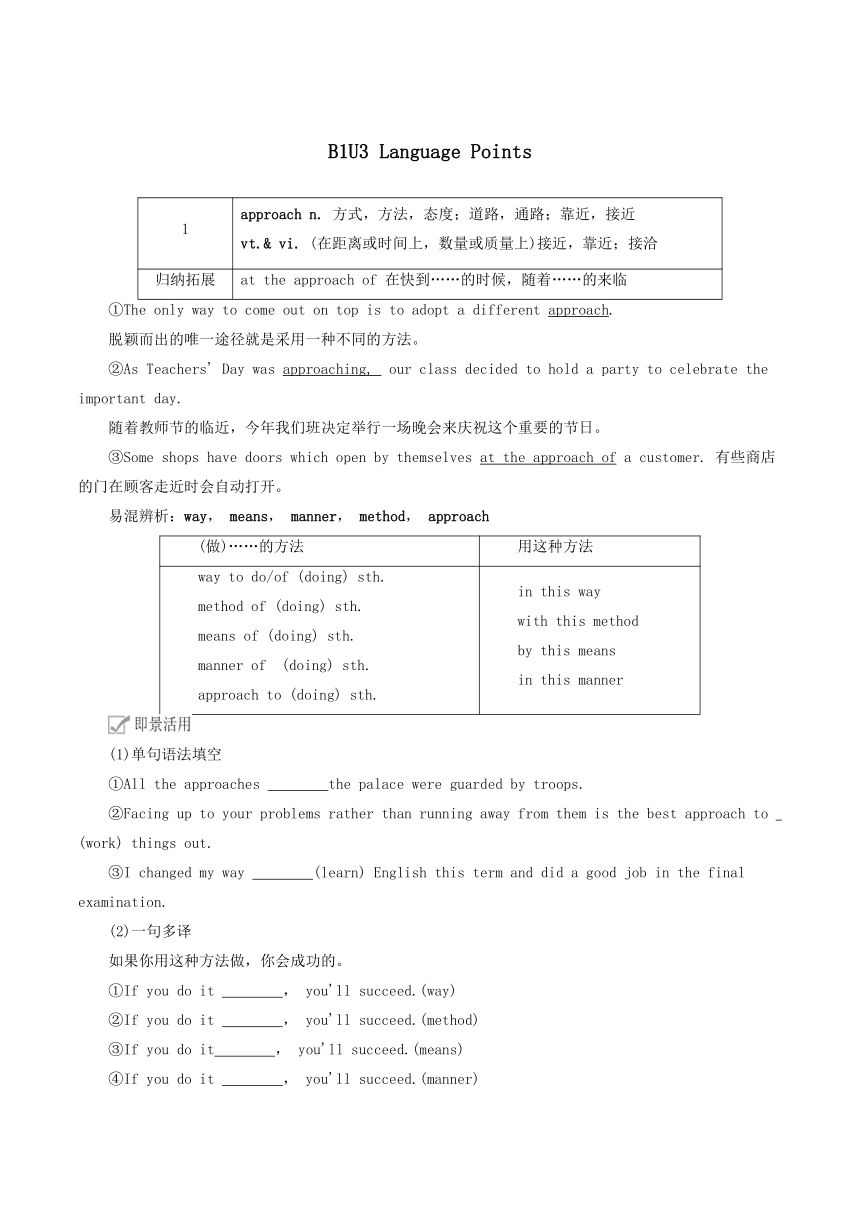 | |
| 格式 | docx | ||
| 文件大小 | 53.8KB | ||
| 资源类型 | 教案 | ||
| 版本资源 | 外研版(2019) | ||
| 科目 | 英语 | ||
| 更新时间 | 2025-01-15 10:20:38 | ||
图片预览

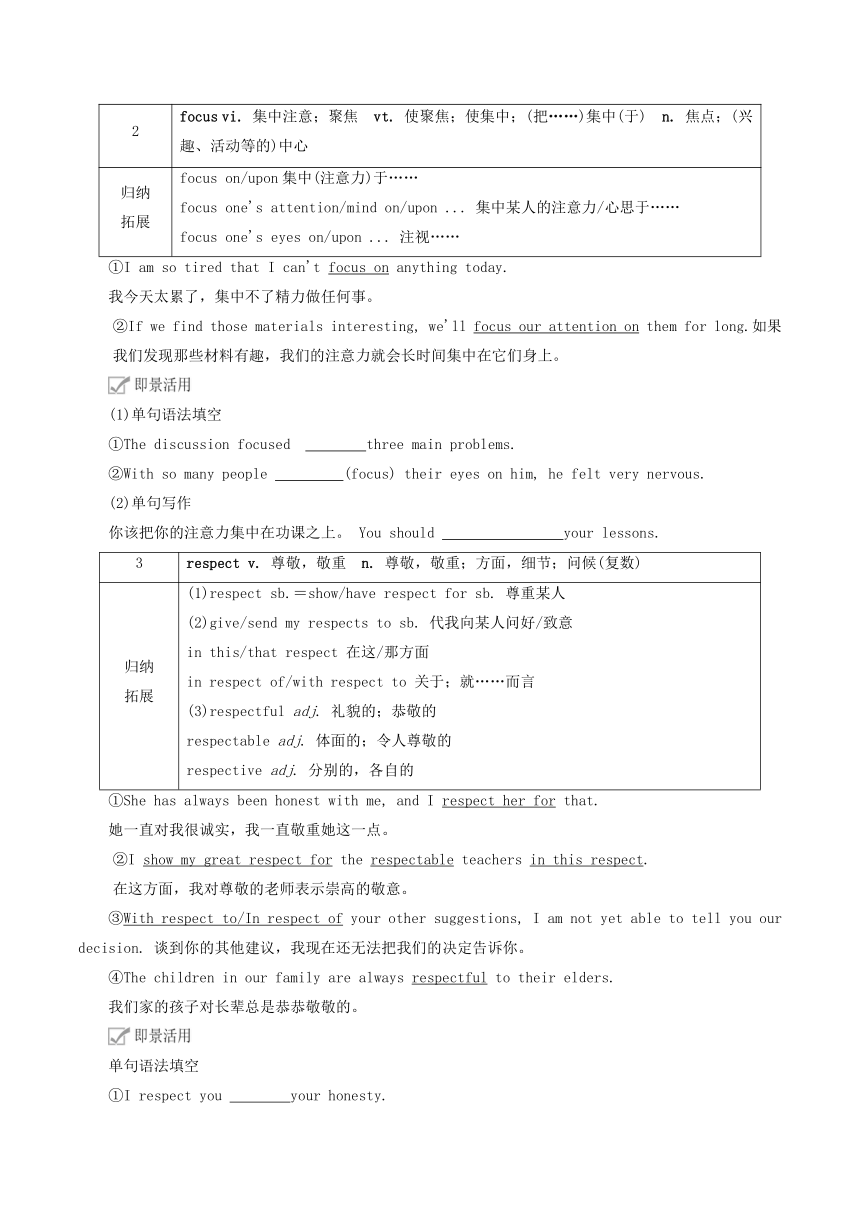
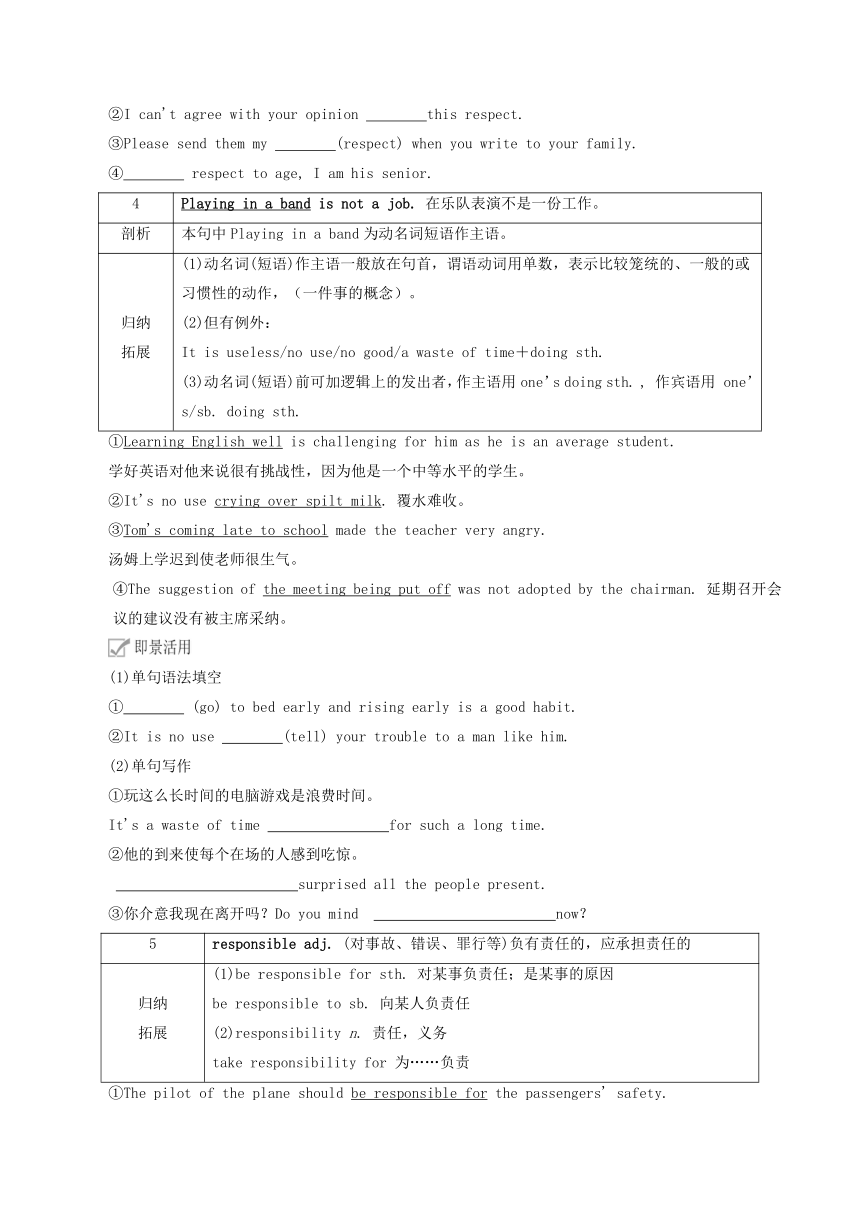
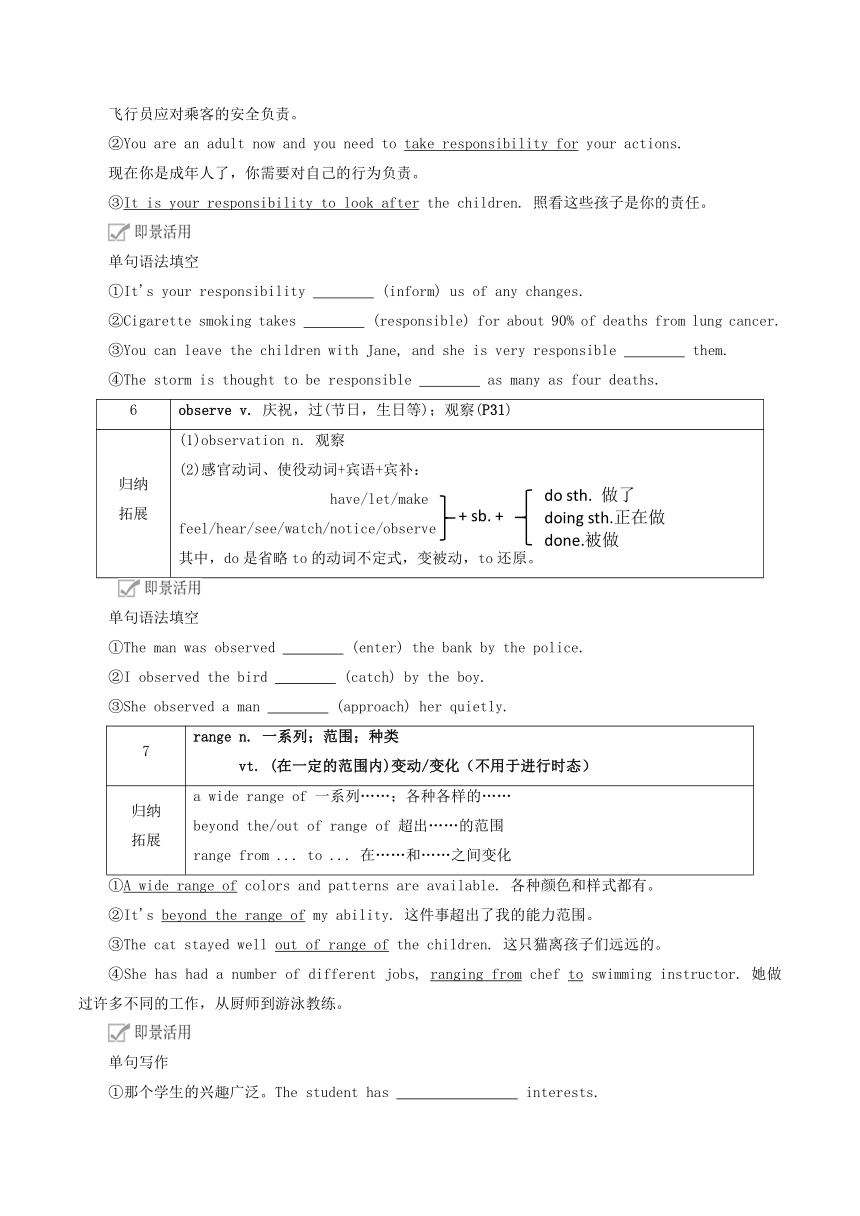
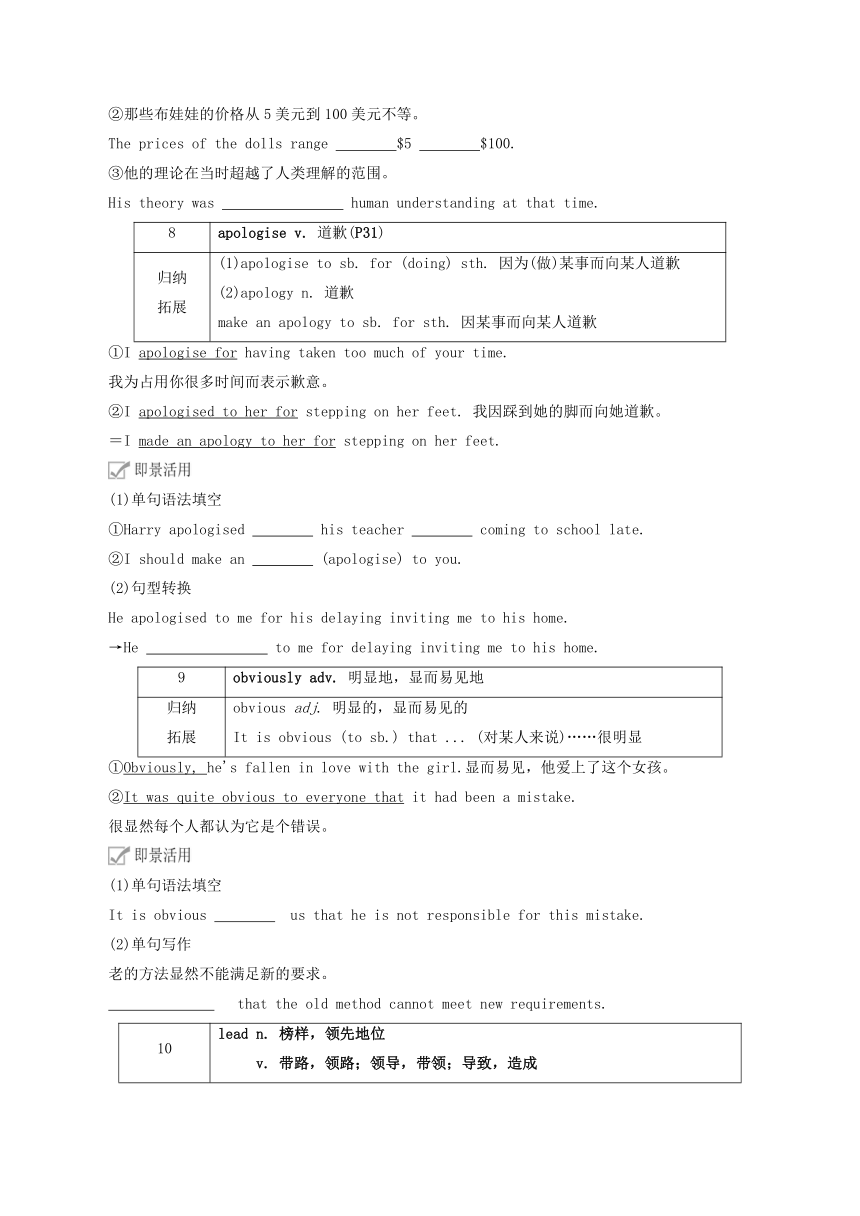
文档简介
B1U3 Language Points
1 approach n. 方式,方法,态度;道路,通路;靠近,接近 vt.& vi. (在距离或时间上,数量或质量上)接近,靠近;接洽
归纳拓展 at the approach of 在快到……的时候,随着……的来临
①The only way to come out on top is to adopt a different approach.
脱颖而出的唯一途径就是采用一种不同的方法。
②As Teachers' Day was approaching, our class decided to hold a party to celebrate the important day.
随着教师节的临近,今年我们班决定举行一场晚会来庆祝这个重要的节日。
③Some shops have doors which open by themselves at the approach of a customer. 有些商店的门在顾客走近时会自动打开。
(做)……的方法 用这种方法
way to do/of (doing) sth. method of (doing) sth. means of (doing) sth. manner of (doing) sth. approach to (doing) sth. in this way with this method by this means in this manner
(1)单句语法填空
①All the approaches the palace were guarded by troops.
②Facing up to your problems rather than running away from them is the best approach to (work) things out.
③I changed my way (learn) English this term and did a good job in the final examination.
(2)一句多译
如果你用这种方法做,你会成功的。
①If you do it , you'll succeed.(way)
②If you do it , you'll succeed.(method)
③If you do it , you'll succeed.(means)
④If you do it , you'll succeed.(manner)
2 focus vi. 集中注意;聚焦 vt. 使聚焦;使集中;(把……)集中(于) n. 焦点;(兴趣、活动等的)中心
归纳 拓展 focus on/upon集中(注意力)于…… focus one's attention/mind on/upon ... 集中某人的注意力/心思于…… focus one's eyes on/upon ... 注视……
①I am so tired that I can't focus on anything today.
我今天太累了,集中不了精力做任何事。
②If we find those materials interesting, we'll focus our attention on them for long.如果我们发现那些材料有趣,我们的注意力就会长时间集中在它们身上。
(1)单句语法填空
①The discussion focused three main problems.
②With so many people (focus) their eyes on him, he felt very nervous.
(2)单句写作
你该把你的注意力集中在功课之上。 You should your lessons.
3 respect v. 尊敬,敬重 n. 尊敬,敬重;方面,细节;问候(复数)
归纳 拓展 (1)respect sb.=show/have respect for sb. 尊重某人 (2)give/send my respects to sb. 代我向某人问好/致意 in this/that respect 在这/那方面 in respect of/with respect to 关于;就……而言 (3)respectful adj. 礼貌的;恭敬的 respectable adj. 体面的;令人尊敬的 respective adj. 分别的,各自的
①She has always been honest with me, and I respect her for that.
她一直对我很诚实,我一直敬重她这一点。
②I show my great respect for the respectable teachers in this respect.
在这方面,我对尊敬的老师表示崇高的敬意。
③With respect to/In respect of your other suggestions, I am not yet able to tell you our decision. 谈到你的其他建议,我现在还无法把我们的决定告诉你。
④The children in our family are always respectful to their elders.
我们家的孩子对长辈总是恭恭敬敬的。
单句语法填空
①I respect you your honesty.
②I can't agree with your opinion this respect.
③Please send them my (respect) when you write to your family.
④ respect to age, I am his senior.
4 Playing in a band is not a job. 在乐队表演不是一份工作。
剖析 本句中Playing in a band为动名词短语作主语。
归纳 拓展 (1)动名词(短语)作主语一般放在句首,谓语动词用单数,表示比较笼统的、一般的或习惯性的动作,(一件事的概念)。 (2)但有例外: It is useless/no use/no good/a waste of time+doing sth. (3)动名词(短语)前可加逻辑上的发出者,作主语用one’s doing sth. , 作宾语用 one’s/sb. doing sth.
①Learning English well is challenging for him as he is an average student.
学好英语对他来说很有挑战性,因为他是一个中等水平的学生。
②It's no use crying over spilt milk. 覆水难收。
③Tom's coming late to school made the teacher very angry.
汤姆上学迟到使老师很生气。
④The suggestion of the meeting being put off was not adopted by the chairman. 延期召开会议的建议没有被主席采纳。
(1)单句语法填空
① (go) to bed early and rising early is a good habit.
②It is no use (tell) your trouble to a man like him.
(2)单句写作
①玩这么长时间的电脑游戏是浪费时间。
It's a waste of time for such a long time.
②他的到来使每个在场的人感到吃惊。
surprised all the people present.
③你介意我现在离开吗?Do you mind now?
5 responsible adj. (对事故、错误、罪行等)负有责任的,应承担责任的
归纳 拓展 (1)be responsible for sth. 对某事负责任;是某事的原因 be responsible to sb. 向某人负责任 (2)responsibility n. 责任,义务 take responsibility for 为……负责
①The pilot of the plane should be responsible for the passengers' safety.
飞行员应对乘客的安全负责。
②You are an adult now and you need to take responsibility for your actions.
现在你是成年人了,你需要对自己的行为负责。
③It is your responsibility to look after the children. 照看这些孩子是你的责任。
单句语法填空
①It's your responsibility (inform) us of any changes.
②Cigarette smoking takes (responsible) for about 90% of deaths from lung cancer.
③You can leave the children with Jane, and she is very responsible them.
④The storm is thought to be responsible as many as four deaths.
6 observe v. 庆祝,过(节日,生日等);观察(P31)
归纳 拓展 (1)observation n. 观察 (2)感官动词、使役动词+宾语+宾补: have/let/make feel/hear/see/watch/notice/observe 其中,do是省略to的动词不定式,变被动,to还原。
单句语法填空
①The man was observed (enter) the bank by the police.
②I observed the bird (catch) by the boy.
③She observed a man (approach) her quietly.
7 range n. 一系列;范围;种类 vt. (在一定的范围内)变动/变化(不用于进行时态)
归纳 拓展 a wide range of 一系列……;各种各样的…… beyond the/out of range of 超出……的范围 range from ... to ... 在……和……之间变化
①A wide range of colors and patterns are available. 各种颜色和样式都有。
②It's beyond the range of my ability. 这件事超出了我的能力范围。
③The cat stayed well out of range of the children. 这只猫离孩子们远远的。
④She has had a number of different jobs, ranging from chef to swimming instructor. 她做过许多不同的工作,从厨师到游泳教练。
单句写作
①那个学生的兴趣广泛。The student has interests.
②那些布娃娃的价格从5美元到100美元不等。
The prices of the dolls range $5 $100.
③他的理论在当时超越了人类理解的范围。
His theory was human understanding at that time.
8 apologise v. 道歉(P31)
归纳 拓展 (1)apologise to sb. for (doing) sth. 因为(做)某事而向某人道歉 (2)apology n. 道歉 make an apology to sb. for sth. 因某事而向某人道歉
①I apologise for having taken too much of your time.
我为占用你很多时间而表示歉意。
②I apologised to her for stepping on her feet. 我因踩到她的脚而向她道歉。
=I made an apology to her for stepping on her feet.
(1)单句语法填空
①Harry apologised his teacher coming to school late.
②I should make an (apologise) to you.
(2)句型转换
He apologised to me for his delaying inviting me to his home.
→He to me for delaying inviting me to his home.
9 obviously adv. 明显地,显而易见地
归纳 拓展 obvious adj. 明显的,显而易见的 It is obvious (to sb.) that ... (对某人来说)……很明显
①Obviously, he's fallen in love with the girl.显而易见,他爱上了这个女孩。
②It was quite obvious to everyone that it had been a mistake.
很显然每个人都认为它是个错误。
(1)单句语法填空
It is obvious us that he is not responsible for this mistake.
(2)单句写作
老的方法显然不能满足新的要求。
that the old method cannot meet new requirements.
10 lead n. 榜样,领先地位 v. 带路,领路;领导,带领;导致,造成
归纳 拓展 (1)take the lead (in doing sth.) 带头(做某事) in the lead 处于领先地位 (2)lead to 导致 lead sb. to sp. 带某人去某处 lead sb. to do sth.=lead to sb. doing sth. 导致某人做某事
①The US took the lead in declaring war on terrorism. 美国带头向恐怖主义宣战。
②A nurse took her arm and led her to a chair. 有位护士搀扶她坐到椅子上。
③Her trusting nature often led her into trouble.
她容易相信别人的性格经常使她遇到麻烦。
④His actions could lead to him losing his job. 他的行为会让他丢掉工作的。
单句写作
①从头到尾都是她领先。She was from start to finish.
②是什么原因让他这次考试没有及格? fail this exam
③他们正在领导一场运动,告诫青少年吸毒的危害。
They are to warn teenagers about the dangers of drug abuse.
11 with复合结构在句中常作原因、条件、时间、方式或伴随状语,也可作后置定语。常见形式有:
归纳 拓展 (1)with+宾语+动词不定式(表示未做) (2)with+宾语+现在分词(表示主动或进行) (3)with+宾语+过去分词 (表示被动或完成) (4)with+宾语+形容词/副词/介词短语(表示状态)
①With a great many articles to write, he won't have time to go shopping this morning. 他有那么多文章要写,今天早上将没有时间去买东西了。
②He lay on the grass with his eyes looking at the sky. 他躺在草地上,眼望天空。
③With my homework finished, I gladly accepted her invitation.
我的作业完成了,我欣然接受了她的邀请。
④In summer, she usually sleeps with the windows open.夏天,她通常开着窗户睡觉。
⑤Alice was lying on the bed with her shoes on. 艾丽斯穿着鞋子躺在床上。
⑥The teacher came in, with a smile on his face. 老师进来了,脸上洋溢着笑容。
单句语法填空
①With prices (go) up, more and more people can't afford a new house.
② a dream in heart, he went to Beijing.
③All the afternoon the scientist worked with the door (lock).
④With a lot of work (do), I couldn't go to the supermarket.
12 “主语+be+adj. +(for sb.) + to do(对某人来说)某事做起来是.......样的
归纳 拓展 (1)其中主语和to do是动宾关系,但要用主动形式表被动含义。 (2)sb. 和 to do是主动关系 (3)形容词多为表示主语性质、特征的词,如hard, difficult, pleasant, easy, comfortable, interesting等。 注意:表示喜、怒、哀、乐等情感的形容词,后跟不定式表原因,不用主表被。
①As the old saying goes: “Flowers are pleasant to look at but hard to grow.”
正如俗话所说:“看花容易栽花难。”
②This city is really comfortable to live in. 这个城市真的很适合居住。
③The long sentence is difficult for you to remember. 这个长句对你来说很难记。
④I'm glad to be told this good news. 我很高兴被告知这个好消息。
(1)单句语法填空
①This machine is very easy (operate). Anybody can learn to use it in a few minutes.
②Tom asked the candy makers if they could make the chocolate easier _________________ (break) into small pieces.
③There is a party tonight in honour of our new president, and I am honored _________________ (invite).
(2)句型转换
I find it difficult to work out this problem in such a short time.
→The problem in such a short time.
B1U3 Grammar 时态
1.一般现在时
(1)构成:动词原形或动词的第三人称单数形式。
(2)基本用法
①一般现在时表示经常或反复发生的动作或存在的状态,常和often, always, usually, sometimes, every day, once a week, rarely, seldom, hardly, ever, never等表示频率的副词连用。
I often read books in my spare time.业余时间我经常看书。
②一般现在时用于描述主语的特征、性格、能力等。
Mary is good at music.玛丽擅长音乐。
He knows a lot of English.他英语懂得很多。
③一般现在时用于陈述客观事实或普遍真理。
The earth moves around the sun.地球绕着太阳转。
Shanghai lies in the east of China.上海位于中国的东部。
④在主从复合句中,当描述将来的事情时,主句用一般将来时,条件状语从句、时间状语从句和让步状语从句用一般现在时代替一般将来时。
You'll make great progress if you work hard! 你如果努力学习,就会取得很大进步。
⑤一般现在时表示按规定、计划或时间表将要发生的动作,通常限于表示“位置转移”的非延续性动词(词组),如go, come, leave, start, begin, open, close, arrive, take off等,其后常跟有表示将来的时间状语。
The train leaves at 7:25 this evening. 火车今晚7:25开。
Our summer vacation begins in early July. 我们的暑假七月初开始。
⑥小说故事、电影、文学作品等的情节介绍、评论等一般使用一般现在时。新闻报道类的内容,为了体现其“新鲜性”,也用一般现在时来表示过去发生的事情。
Harry Potter is set in the modern world. 《哈利·波特》以现代世界为背景。
⑦一般现在时常用于格言或警句中。
Pride goes before a fall. 骄者必败。
2.现在进行时
(1)构成:is/am/are+现在分词。
(2)基本用法
①现在进行时表示现在或目前一段时间内正在进行的动作,常与now, at present, at this moment, these days, this week/month等时间状语连用。
All the classmates are reviewing the lesson in the classroom now.
同学们正在教室里复习功课。
These days we are helping the farmers work on the farm.
这些天我们一直在农场帮农民们干活。
②现在进行时常与always, continually, constantly, forever等表示频度的副词连用,表示经常、反复发生的动作,常含有厌烦、责备、愤怒、抱怨、赞扬等情感。
She is always thinking of others instead of herself. 她总是想着别人而不是她自己。
The boy is constantly asking such silly questions. 那个男孩老是提这类愚蠢的问题。
③现在进行时可以表示将来的动作,主要用于表示按计划或安排要发生的动作。常与come, go, leave, depart, arrive, stay, start/begin, take off等动词(词组)连用。
Mr Smith is leaving for Nanjing tonight. 史密斯先生今晚去南京。
The meeting is beginning at three this afternoon. 会议在下午三点开始。
3.现在完成时
(1)构成:have/has+过去分词。
(2)基本用法
①现在完成时表示动作发生在过去,但对现在造成一定的影响或结果,常与already, yet, never, before, so far, up to now等连用。
I have already made a plan for my study ahead of time. 我已经提前制订了学习计划。
—Have you finished your homework yet 你做完作业了吗?
—Yes, I have already finished it. 是的,我已经做完了。
②现在完成时所表示的动作从过去开始持续到现在,也许还会继续下去。常用的时间状语有:for+时间段,since+过去的时间点,so far, recently, lately, this week, this month, this year, these days, during/in the last/past few years等。
We have learned English for eight years. 我们学英语八年了。
He has lived in London since three years ago. 自从三年前他就住在伦敦。
注意:当现在完成时表示动作持续时,谓语动词应该使用延续性动词。
He has left for ten minutes.(×)
He has been away for ten minutes. (√) 他已经离开十分钟了。
He has bought this book for two months. (×)
He has had this book for two months. (√) 他买这本书已有两个月了。
③在“It/This is the first/second ... last time+从句”与“It/This is the+序数词或形容词最高级+名词+that从句”这两个句型中,从句中的谓语要用现在完成时。
It is the first time I have driven a car. 这是我第一次开车。
This is the most interesting film that he has made. 这是他拍的最有趣的电影。
④现在完成时可用在状语从句中代替将来完成时,这时从句的动作要先于主句的动作发生。
I'll go to the party as soon as I have finished my homework.
我一完成作业就去参加聚会。
4.一般将来时
(1)构成:shall/will+动词原形,be going to+动词原形,be (about) to do sth.
(2)基本用法
①shall/will+动词原形,表示即将发生的动作或存在的状态,特别是表示客观性的事情或在某条件下临时决定去做的事情只能用此结构。
I will/shall go to visit him next week. 下周我将去拜访他。
—Tom was injured badly in the accident yesterday. 汤姆在昨天的事故中受伤很严重。
—Oh, I didn't know. I will see him after work. 噢,我不知道。我下班后去看他。
②will+动词原形,表示习惯性动作或未来的倾向。
Wherever he goes, he will take an umbrella with him.
无论到哪儿,他总是带着一把伞。
Oil will float on water. 油总是浮在水上。
③be going to+动词原形,表示即将发生的事情或近期准备、打算、有迹象表明要做某事。
What are you going to do next Sunday 下星期天你打算干什么?
Look at the black clouds!It is going to rain. 瞧那些乌云!要下雨了。
④be (just) about to+动词原形,表示即将发生的事,常译为“刚要……,就要……”,不能与表示将来的具体时间状语连用,但常与when连用。
Please get everything ready. The experiment is about to start.
请准备好。实验就要开始了。
⑤be to do表示按计划、职责、义务、约定要发生的动作。
Who is to clean the classroom today 今天该谁打扫教室了?
5.一般过去时
(1)构成:动词过去式。
(2)基本用法
①一般过去时表示过去某一时刻或某段时间内发生的动作或存在的状态,常与明确表示过去的时间状语,如:yesterday, last week, in 1949, in the past, a few days ago等连用。
I graduated from No.1 Middle School three years ago. 三年前我从一中毕业。
I had two eggs and a glass of milk for breakfast this morning.
今天早上我吃了两个鸡蛋,喝了一杯牛奶。
注意:有些句子,虽然没有表示过去确定时间的状语,但实际上是指过去发生的动作或存在的状态时,也要用一般过去时。如:
Your phone number again I didn't quite catch it.
再说一遍你的电话号码好吗?我刚才没听见。
②一般过去时表示过去连续发生的一系列动作。
She got up, washed her face, cleaned her teeth, had her breakfast and then went to work. 她起床后,洗完脸,刷完牙,吃过早饭,然后就去上班了。
③一般过去时表示过去一段时间内经常发生的或习惯性的动作。常与often, usually, sometimes等表示频度的词连用。
When I was a teenager, I played table tennis almost every day.
我十几岁时,几乎每天都打乒乓球。
Her father usually did some housework at home last year.
她爸爸去年常常在家做些家务。
④一般过去时表示说话人原来没有料到、想到的事。
I didn't know you were here. How long have you been here
我不知道你在这里,你来了多久了?
⑤在时间、条件或让步状语从句中,常用一般过去时代替过去将来时,表示过去将要发生的动作。
He said he would not go if it rained. 他说如果下雨他就不去了。
名师点津
一般过去时与现在完成时的区别
概念 不同 一般过去时只表示动作发生在过去,与现在无关,属于“过去”的时态范畴;现在完成时的动作虽然发生在过去,但强调的是对现在造成的影响和结果,属于“现在时”范畴。
时间状 语不同 一般过去时常与表示过去的时间状语连用,如:yesterday, two days ago, last year等。现在完成时往往不与表示过去的时间状语连用,而是多与before, already, ever, never, ever since, since, for+时间段等连用。
—Have you seen my dictionary 你见过我的词典吗?
—Yes, I saw it on your bed yesterday. 是的,我昨天看见它在你床上。
Ⅰ.单句语法填空
1.The old man often (take) a walk after supper in the park with his pet dog following him.
2.—What did the teacher say just now
—He said that the earth (move) around the sun.
3.Listen! Who (knock) at the front door
4.Hurry up, Peter! The taxi (wait) for us at the gate of the hotel.
5.His first novel (receive) good reviews since it came out last month.
6.This is the first time I (come) to Chengdu and I am deeply impressed with its delicious food.
7.I often (study) late into the night when I was in Senior Three.
8.Sorry, Helen, I (not know) you were here.
9.—Mary has been in hospital for a week.
—Really I (go) to see her this afternoon.
10.We are (meet) at the school gate at six in the morning.
Ⅱ.单句写作
1.除非我亲眼看到,否则我不会相信你的。
I unless I have seen it with my own eyes.
2.哥伦布证实了地球是圆的。Columbus proved that .
3.在过去的三年里我经历了很多事情。
I in the past three years.
4.今天早晨汤姆自己做饭,因为他的父母不在家。
This morning Tom because his parents weren't at home.
5.我不能帮助你做家务,因为我现在在做作业。
I can't help you with the housework because I now.
1 approach n. 方式,方法,态度;道路,通路;靠近,接近 vt.& vi. (在距离或时间上,数量或质量上)接近,靠近;接洽
归纳拓展 at the approach of 在快到……的时候,随着……的来临
①The only way to come out on top is to adopt a different approach.
脱颖而出的唯一途径就是采用一种不同的方法。
②As Teachers' Day was approaching, our class decided to hold a party to celebrate the important day.
随着教师节的临近,今年我们班决定举行一场晚会来庆祝这个重要的节日。
③Some shops have doors which open by themselves at the approach of a customer. 有些商店的门在顾客走近时会自动打开。
(做)……的方法 用这种方法
way to do/of (doing) sth. method of (doing) sth. means of (doing) sth. manner of (doing) sth. approach to (doing) sth. in this way with this method by this means in this manner
(1)单句语法填空
①All the approaches the palace were guarded by troops.
②Facing up to your problems rather than running away from them is the best approach to (work) things out.
③I changed my way (learn) English this term and did a good job in the final examination.
(2)一句多译
如果你用这种方法做,你会成功的。
①If you do it , you'll succeed.(way)
②If you do it , you'll succeed.(method)
③If you do it , you'll succeed.(means)
④If you do it , you'll succeed.(manner)
2 focus vi. 集中注意;聚焦 vt. 使聚焦;使集中;(把……)集中(于) n. 焦点;(兴趣、活动等的)中心
归纳 拓展 focus on/upon集中(注意力)于…… focus one's attention/mind on/upon ... 集中某人的注意力/心思于…… focus one's eyes on/upon ... 注视……
①I am so tired that I can't focus on anything today.
我今天太累了,集中不了精力做任何事。
②If we find those materials interesting, we'll focus our attention on them for long.如果我们发现那些材料有趣,我们的注意力就会长时间集中在它们身上。
(1)单句语法填空
①The discussion focused three main problems.
②With so many people (focus) their eyes on him, he felt very nervous.
(2)单句写作
你该把你的注意力集中在功课之上。 You should your lessons.
3 respect v. 尊敬,敬重 n. 尊敬,敬重;方面,细节;问候(复数)
归纳 拓展 (1)respect sb.=show/have respect for sb. 尊重某人 (2)give/send my respects to sb. 代我向某人问好/致意 in this/that respect 在这/那方面 in respect of/with respect to 关于;就……而言 (3)respectful adj. 礼貌的;恭敬的 respectable adj. 体面的;令人尊敬的 respective adj. 分别的,各自的
①She has always been honest with me, and I respect her for that.
她一直对我很诚实,我一直敬重她这一点。
②I show my great respect for the respectable teachers in this respect.
在这方面,我对尊敬的老师表示崇高的敬意。
③With respect to/In respect of your other suggestions, I am not yet able to tell you our decision. 谈到你的其他建议,我现在还无法把我们的决定告诉你。
④The children in our family are always respectful to their elders.
我们家的孩子对长辈总是恭恭敬敬的。
单句语法填空
①I respect you your honesty.
②I can't agree with your opinion this respect.
③Please send them my (respect) when you write to your family.
④ respect to age, I am his senior.
4 Playing in a band is not a job. 在乐队表演不是一份工作。
剖析 本句中Playing in a band为动名词短语作主语。
归纳 拓展 (1)动名词(短语)作主语一般放在句首,谓语动词用单数,表示比较笼统的、一般的或习惯性的动作,(一件事的概念)。 (2)但有例外: It is useless/no use/no good/a waste of time+doing sth. (3)动名词(短语)前可加逻辑上的发出者,作主语用one’s doing sth. , 作宾语用 one’s/sb. doing sth.
①Learning English well is challenging for him as he is an average student.
学好英语对他来说很有挑战性,因为他是一个中等水平的学生。
②It's no use crying over spilt milk. 覆水难收。
③Tom's coming late to school made the teacher very angry.
汤姆上学迟到使老师很生气。
④The suggestion of the meeting being put off was not adopted by the chairman. 延期召开会议的建议没有被主席采纳。
(1)单句语法填空
① (go) to bed early and rising early is a good habit.
②It is no use (tell) your trouble to a man like him.
(2)单句写作
①玩这么长时间的电脑游戏是浪费时间。
It's a waste of time for such a long time.
②他的到来使每个在场的人感到吃惊。
surprised all the people present.
③你介意我现在离开吗?Do you mind now?
5 responsible adj. (对事故、错误、罪行等)负有责任的,应承担责任的
归纳 拓展 (1)be responsible for sth. 对某事负责任;是某事的原因 be responsible to sb. 向某人负责任 (2)responsibility n. 责任,义务 take responsibility for 为……负责
①The pilot of the plane should be responsible for the passengers' safety.
飞行员应对乘客的安全负责。
②You are an adult now and you need to take responsibility for your actions.
现在你是成年人了,你需要对自己的行为负责。
③It is your responsibility to look after the children. 照看这些孩子是你的责任。
单句语法填空
①It's your responsibility (inform) us of any changes.
②Cigarette smoking takes (responsible) for about 90% of deaths from lung cancer.
③You can leave the children with Jane, and she is very responsible them.
④The storm is thought to be responsible as many as four deaths.
6 observe v. 庆祝,过(节日,生日等);观察(P31)
归纳 拓展 (1)observation n. 观察 (2)感官动词、使役动词+宾语+宾补: have/let/make feel/hear/see/watch/notice/observe 其中,do是省略to的动词不定式,变被动,to还原。
单句语法填空
①The man was observed (enter) the bank by the police.
②I observed the bird (catch) by the boy.
③She observed a man (approach) her quietly.
7 range n. 一系列;范围;种类 vt. (在一定的范围内)变动/变化(不用于进行时态)
归纳 拓展 a wide range of 一系列……;各种各样的…… beyond the/out of range of 超出……的范围 range from ... to ... 在……和……之间变化
①A wide range of colors and patterns are available. 各种颜色和样式都有。
②It's beyond the range of my ability. 这件事超出了我的能力范围。
③The cat stayed well out of range of the children. 这只猫离孩子们远远的。
④She has had a number of different jobs, ranging from chef to swimming instructor. 她做过许多不同的工作,从厨师到游泳教练。
单句写作
①那个学生的兴趣广泛。The student has interests.
②那些布娃娃的价格从5美元到100美元不等。
The prices of the dolls range $5 $100.
③他的理论在当时超越了人类理解的范围。
His theory was human understanding at that time.
8 apologise v. 道歉(P31)
归纳 拓展 (1)apologise to sb. for (doing) sth. 因为(做)某事而向某人道歉 (2)apology n. 道歉 make an apology to sb. for sth. 因某事而向某人道歉
①I apologise for having taken too much of your time.
我为占用你很多时间而表示歉意。
②I apologised to her for stepping on her feet. 我因踩到她的脚而向她道歉。
=I made an apology to her for stepping on her feet.
(1)单句语法填空
①Harry apologised his teacher coming to school late.
②I should make an (apologise) to you.
(2)句型转换
He apologised to me for his delaying inviting me to his home.
→He to me for delaying inviting me to his home.
9 obviously adv. 明显地,显而易见地
归纳 拓展 obvious adj. 明显的,显而易见的 It is obvious (to sb.) that ... (对某人来说)……很明显
①Obviously, he's fallen in love with the girl.显而易见,他爱上了这个女孩。
②It was quite obvious to everyone that it had been a mistake.
很显然每个人都认为它是个错误。
(1)单句语法填空
It is obvious us that he is not responsible for this mistake.
(2)单句写作
老的方法显然不能满足新的要求。
that the old method cannot meet new requirements.
10 lead n. 榜样,领先地位 v. 带路,领路;领导,带领;导致,造成
归纳 拓展 (1)take the lead (in doing sth.) 带头(做某事) in the lead 处于领先地位 (2)lead to 导致 lead sb. to sp. 带某人去某处 lead sb. to do sth.=lead to sb. doing sth. 导致某人做某事
①The US took the lead in declaring war on terrorism. 美国带头向恐怖主义宣战。
②A nurse took her arm and led her to a chair. 有位护士搀扶她坐到椅子上。
③Her trusting nature often led her into trouble.
她容易相信别人的性格经常使她遇到麻烦。
④His actions could lead to him losing his job. 他的行为会让他丢掉工作的。
单句写作
①从头到尾都是她领先。She was from start to finish.
②是什么原因让他这次考试没有及格? fail this exam
③他们正在领导一场运动,告诫青少年吸毒的危害。
They are to warn teenagers about the dangers of drug abuse.
11 with复合结构在句中常作原因、条件、时间、方式或伴随状语,也可作后置定语。常见形式有:
归纳 拓展 (1)with+宾语+动词不定式(表示未做) (2)with+宾语+现在分词(表示主动或进行) (3)with+宾语+过去分词 (表示被动或完成) (4)with+宾语+形容词/副词/介词短语(表示状态)
①With a great many articles to write, he won't have time to go shopping this morning. 他有那么多文章要写,今天早上将没有时间去买东西了。
②He lay on the grass with his eyes looking at the sky. 他躺在草地上,眼望天空。
③With my homework finished, I gladly accepted her invitation.
我的作业完成了,我欣然接受了她的邀请。
④In summer, she usually sleeps with the windows open.夏天,她通常开着窗户睡觉。
⑤Alice was lying on the bed with her shoes on. 艾丽斯穿着鞋子躺在床上。
⑥The teacher came in, with a smile on his face. 老师进来了,脸上洋溢着笑容。
单句语法填空
①With prices (go) up, more and more people can't afford a new house.
② a dream in heart, he went to Beijing.
③All the afternoon the scientist worked with the door (lock).
④With a lot of work (do), I couldn't go to the supermarket.
12 “主语+be+adj. +(for sb.) + to do(对某人来说)某事做起来是.......样的
归纳 拓展 (1)其中主语和to do是动宾关系,但要用主动形式表被动含义。 (2)sb. 和 to do是主动关系 (3)形容词多为表示主语性质、特征的词,如hard, difficult, pleasant, easy, comfortable, interesting等。 注意:表示喜、怒、哀、乐等情感的形容词,后跟不定式表原因,不用主表被。
①As the old saying goes: “Flowers are pleasant to look at but hard to grow.”
正如俗话所说:“看花容易栽花难。”
②This city is really comfortable to live in. 这个城市真的很适合居住。
③The long sentence is difficult for you to remember. 这个长句对你来说很难记。
④I'm glad to be told this good news. 我很高兴被告知这个好消息。
(1)单句语法填空
①This machine is very easy (operate). Anybody can learn to use it in a few minutes.
②Tom asked the candy makers if they could make the chocolate easier _________________ (break) into small pieces.
③There is a party tonight in honour of our new president, and I am honored _________________ (invite).
(2)句型转换
I find it difficult to work out this problem in such a short time.
→The problem in such a short time.
B1U3 Grammar 时态
1.一般现在时
(1)构成:动词原形或动词的第三人称单数形式。
(2)基本用法
①一般现在时表示经常或反复发生的动作或存在的状态,常和often, always, usually, sometimes, every day, once a week, rarely, seldom, hardly, ever, never等表示频率的副词连用。
I often read books in my spare time.业余时间我经常看书。
②一般现在时用于描述主语的特征、性格、能力等。
Mary is good at music.玛丽擅长音乐。
He knows a lot of English.他英语懂得很多。
③一般现在时用于陈述客观事实或普遍真理。
The earth moves around the sun.地球绕着太阳转。
Shanghai lies in the east of China.上海位于中国的东部。
④在主从复合句中,当描述将来的事情时,主句用一般将来时,条件状语从句、时间状语从句和让步状语从句用一般现在时代替一般将来时。
You'll make great progress if you work hard! 你如果努力学习,就会取得很大进步。
⑤一般现在时表示按规定、计划或时间表将要发生的动作,通常限于表示“位置转移”的非延续性动词(词组),如go, come, leave, start, begin, open, close, arrive, take off等,其后常跟有表示将来的时间状语。
The train leaves at 7:25 this evening. 火车今晚7:25开。
Our summer vacation begins in early July. 我们的暑假七月初开始。
⑥小说故事、电影、文学作品等的情节介绍、评论等一般使用一般现在时。新闻报道类的内容,为了体现其“新鲜性”,也用一般现在时来表示过去发生的事情。
Harry Potter is set in the modern world. 《哈利·波特》以现代世界为背景。
⑦一般现在时常用于格言或警句中。
Pride goes before a fall. 骄者必败。
2.现在进行时
(1)构成:is/am/are+现在分词。
(2)基本用法
①现在进行时表示现在或目前一段时间内正在进行的动作,常与now, at present, at this moment, these days, this week/month等时间状语连用。
All the classmates are reviewing the lesson in the classroom now.
同学们正在教室里复习功课。
These days we are helping the farmers work on the farm.
这些天我们一直在农场帮农民们干活。
②现在进行时常与always, continually, constantly, forever等表示频度的副词连用,表示经常、反复发生的动作,常含有厌烦、责备、愤怒、抱怨、赞扬等情感。
She is always thinking of others instead of herself. 她总是想着别人而不是她自己。
The boy is constantly asking such silly questions. 那个男孩老是提这类愚蠢的问题。
③现在进行时可以表示将来的动作,主要用于表示按计划或安排要发生的动作。常与come, go, leave, depart, arrive, stay, start/begin, take off等动词(词组)连用。
Mr Smith is leaving for Nanjing tonight. 史密斯先生今晚去南京。
The meeting is beginning at three this afternoon. 会议在下午三点开始。
3.现在完成时
(1)构成:have/has+过去分词。
(2)基本用法
①现在完成时表示动作发生在过去,但对现在造成一定的影响或结果,常与already, yet, never, before, so far, up to now等连用。
I have already made a plan for my study ahead of time. 我已经提前制订了学习计划。
—Have you finished your homework yet 你做完作业了吗?
—Yes, I have already finished it. 是的,我已经做完了。
②现在完成时所表示的动作从过去开始持续到现在,也许还会继续下去。常用的时间状语有:for+时间段,since+过去的时间点,so far, recently, lately, this week, this month, this year, these days, during/in the last/past few years等。
We have learned English for eight years. 我们学英语八年了。
He has lived in London since three years ago. 自从三年前他就住在伦敦。
注意:当现在完成时表示动作持续时,谓语动词应该使用延续性动词。
He has left for ten minutes.(×)
He has been away for ten minutes. (√) 他已经离开十分钟了。
He has bought this book for two months. (×)
He has had this book for two months. (√) 他买这本书已有两个月了。
③在“It/This is the first/second ... last time+从句”与“It/This is the+序数词或形容词最高级+名词+that从句”这两个句型中,从句中的谓语要用现在完成时。
It is the first time I have driven a car. 这是我第一次开车。
This is the most interesting film that he has made. 这是他拍的最有趣的电影。
④现在完成时可用在状语从句中代替将来完成时,这时从句的动作要先于主句的动作发生。
I'll go to the party as soon as I have finished my homework.
我一完成作业就去参加聚会。
4.一般将来时
(1)构成:shall/will+动词原形,be going to+动词原形,be (about) to do sth.
(2)基本用法
①shall/will+动词原形,表示即将发生的动作或存在的状态,特别是表示客观性的事情或在某条件下临时决定去做的事情只能用此结构。
I will/shall go to visit him next week. 下周我将去拜访他。
—Tom was injured badly in the accident yesterday. 汤姆在昨天的事故中受伤很严重。
—Oh, I didn't know. I will see him after work. 噢,我不知道。我下班后去看他。
②will+动词原形,表示习惯性动作或未来的倾向。
Wherever he goes, he will take an umbrella with him.
无论到哪儿,他总是带着一把伞。
Oil will float on water. 油总是浮在水上。
③be going to+动词原形,表示即将发生的事情或近期准备、打算、有迹象表明要做某事。
What are you going to do next Sunday 下星期天你打算干什么?
Look at the black clouds!It is going to rain. 瞧那些乌云!要下雨了。
④be (just) about to+动词原形,表示即将发生的事,常译为“刚要……,就要……”,不能与表示将来的具体时间状语连用,但常与when连用。
Please get everything ready. The experiment is about to start.
请准备好。实验就要开始了。
⑤be to do表示按计划、职责、义务、约定要发生的动作。
Who is to clean the classroom today 今天该谁打扫教室了?
5.一般过去时
(1)构成:动词过去式。
(2)基本用法
①一般过去时表示过去某一时刻或某段时间内发生的动作或存在的状态,常与明确表示过去的时间状语,如:yesterday, last week, in 1949, in the past, a few days ago等连用。
I graduated from No.1 Middle School three years ago. 三年前我从一中毕业。
I had two eggs and a glass of milk for breakfast this morning.
今天早上我吃了两个鸡蛋,喝了一杯牛奶。
注意:有些句子,虽然没有表示过去确定时间的状语,但实际上是指过去发生的动作或存在的状态时,也要用一般过去时。如:
Your phone number again I didn't quite catch it.
再说一遍你的电话号码好吗?我刚才没听见。
②一般过去时表示过去连续发生的一系列动作。
She got up, washed her face, cleaned her teeth, had her breakfast and then went to work. 她起床后,洗完脸,刷完牙,吃过早饭,然后就去上班了。
③一般过去时表示过去一段时间内经常发生的或习惯性的动作。常与often, usually, sometimes等表示频度的词连用。
When I was a teenager, I played table tennis almost every day.
我十几岁时,几乎每天都打乒乓球。
Her father usually did some housework at home last year.
她爸爸去年常常在家做些家务。
④一般过去时表示说话人原来没有料到、想到的事。
I didn't know you were here. How long have you been here
我不知道你在这里,你来了多久了?
⑤在时间、条件或让步状语从句中,常用一般过去时代替过去将来时,表示过去将要发生的动作。
He said he would not go if it rained. 他说如果下雨他就不去了。
名师点津
一般过去时与现在完成时的区别
概念 不同 一般过去时只表示动作发生在过去,与现在无关,属于“过去”的时态范畴;现在完成时的动作虽然发生在过去,但强调的是对现在造成的影响和结果,属于“现在时”范畴。
时间状 语不同 一般过去时常与表示过去的时间状语连用,如:yesterday, two days ago, last year等。现在完成时往往不与表示过去的时间状语连用,而是多与before, already, ever, never, ever since, since, for+时间段等连用。
—Have you seen my dictionary 你见过我的词典吗?
—Yes, I saw it on your bed yesterday. 是的,我昨天看见它在你床上。
Ⅰ.单句语法填空
1.The old man often (take) a walk after supper in the park with his pet dog following him.
2.—What did the teacher say just now
—He said that the earth (move) around the sun.
3.Listen! Who (knock) at the front door
4.Hurry up, Peter! The taxi (wait) for us at the gate of the hotel.
5.His first novel (receive) good reviews since it came out last month.
6.This is the first time I (come) to Chengdu and I am deeply impressed with its delicious food.
7.I often (study) late into the night when I was in Senior Three.
8.Sorry, Helen, I (not know) you were here.
9.—Mary has been in hospital for a week.
—Really I (go) to see her this afternoon.
10.We are (meet) at the school gate at six in the morning.
Ⅱ.单句写作
1.除非我亲眼看到,否则我不会相信你的。
I unless I have seen it with my own eyes.
2.哥伦布证实了地球是圆的。Columbus proved that .
3.在过去的三年里我经历了很多事情。
I in the past three years.
4.今天早晨汤姆自己做饭,因为他的父母不在家。
This morning Tom because his parents weren't at home.
5.我不能帮助你做家务,因为我现在在做作业。
I can't help you with the housework because I now.
